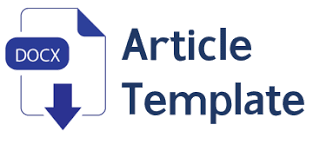Pengembangan E-Modul Interaktif Berbasis STEM untuk Meningkatkan Literasi Sains dan Digital Siswa Madrasah Aliyah
DOI:
https://doi.org/10.010125/n44avx46Keywords:
Learning Media, IPAS SD/MI, Augmented RealityAbstract
Learning Natural and Social Sciences (IPAS) in the Merdeka Curriculum Era requires an innovative approach. However, the practice in the field is still dominated by conventional methods that do not involve students. This study aims to develop and test the feasibility and effectiveness of integrated learning packages that combine project-based teaching materials with media augmented reality (AR) for elementary/MI students. This study uses research and development methods (R&D) with a systematic ADDIE model. Research data sources involve material experts, media experts, class V teachers, and grade V SD/MI students as research and trial subjects. The results showed that the IPAS-PROAR learning package developed was declared very feasible by the expert validator and was very practical for use by teachers and students based on the response questionnaire analysis. Furthermore, the product is proven to be significantly effective in improving student learning outcomes, which is demonstrated by the achievement of the average N-Gain Score in the high category. This finding implies that the integration of project-based pedagogy with AR technology is a potential solution to create active, meaningful, and in accordance with the demands of 21st-century skills.
Downloads
References
Adam Sugiarto, & Sutikno. (2022). Pengaruh Kompetensi Profesional Guru Dan Penggunaan Metode Ummi Terhadap Kemampuan Membaca Al-Qur’an Siwa, 3, 150–163. Retrieved from https://ejurnal.darulfattah.ac.id/index.php/Annaba
Astuti, I. A. D., Bhakti, Y. B., & Sumarni, R. A. (2019). Pengembangan e-modul fisika berbasis STEM untuk meningkatkan literasi sains dan digital. Jurnal Pendidikan Fisika dan Teknologi, 5(2), 240-248.
Auliya, V., Nurlaela, L., & Rijanto, T. (2020). Metodologi penelitian pendidikan. PT Remaja Rosdakarya.
Davis, F. D. (1989). Perceived usefulness, perceived ease of use, and user acceptance of information technology. MIS Quarterly, 13(3), 319-340.
Ghony, M. D., & Almanshur, F. (2020). Metodologi penelitian kualitatif. Ar-Ruzz Media.
Haryono, E., Rangkuti, Rizki Kurniawan, Sariman, S., & Suprihatiningsih, S. (2024). Metodologi Penelitian Kualitatif dan Kuantitatif . Https://Www.Rcipress.Rcipublisher.Org/Index.Php/Rcipress/Catalog/Book/949. Perkumpulan Rumah Cemerlang Indonesia.
Hartoyo, H. (2025). Sejarah Peradaban Islam. Meta Nusantara. Blora: Meta Nusantara
Illah, A., Mansur, R., Hidayatullah, M. F., Sariman, S., & Seena, I. (2022). Principal Leadership in Developing the Competence of Islamic Religious Education Teachers. Nidhomul Haq: Jurnal Manajemen Pendidikan Islam, 7(3). Retrieved from https://www.e-journal.uac.ac.id/index.php/nidhomulhaq/article/view/2658/1077
Hasan, M., Milama, B., & Safitri, I. (2013). Penelitian dan pengembangan dalam pendidikan. Lentera Ilmu Cendekia.
Hidayat, T., Susilaningsih, E., & Kurniawan, C. (2020). Literasi digital dalam pembelajaran: Konsep, implementasi, dan evaluasi. Deepublish.
Mayer, R. E. (2009). Multimedia learning (2nd ed.). Cambridge University Press.
Muslih, S., Sutikno, S. P. I., & Rinda Fauzian, M. P. (2023). AKHLAK MUSLIM DAN DOA-DOA. Intake Pustaka.
Mustain, M., Karjo, K., & Falah, A. (2025). Tafsir Tarbawi. Meta Nusantara. Blora: Meta Nusantara.
Muchlisin, I. (2025). Psikologi Pendidikan. Meta Nusantara. Blora: Meta Nusantara.
Nadifah, N. (2024). Efektivitas model STEAM dalam meningkatkan minat belajar siswa. Jurnal Pendidikan Indonesia, 15(1), 45-58.
OECD. (2019). PISA 2018 assessment and analytical framework. OECD Publishing.
Piaget, J. (1977). The development of thought: Equilibration of cognitive structures. Viking Press.
Pratiwi, W., & Rochmad, R. (2022). Penerapan pendekatan STEM melalui proyek untuk meningkatkan kemampuan berpikir kreatif siswa SMP. Jurnal Pendidikan Matematika dan Sains, 10(1), 23-35.
Sariman, Haryono, E., Wahyudin, M., & Muttaqin, F. Z. (2024). Exploring Research Methodologies Qualitative In Higher Education: Strategies And Approaches For Academic Inquiry. Al Fattah Ejournal Sma Al Muhammad Cepu, 4(01), 74–103. Retrieved from https://www.ejournal.smaamc.sch.id/index.php/belajar/article/view/43
Sariman, Huda, C., & Afif, M. N. (2021). Pengembangan Mutu Peserta Didik dalam Pembelajaran : Implementasi Profesionalisme Guru Madrasah. Jurnal Pendidikan Agama Islam Al-Thariqah, 6(2). https://doi.org/10.25299/al-
Sariman, S. (2025). Transformasi Ekologis Berbasis Spiritualitas: Studi Ekoteologis atas Peran ASN, Masyarakat, dan Gerakan Hijau. MetaNusantara.Com. MetaNusantara.com.
Siyoto, S., & Ali Sodik, M. (2015). Dasar Metodologi Penelitian. (Ayup, Ed.), Literasi Media Publishing (1st ed.). Yogyakarta: Literasi Media Publishing.
Sri Wahyuningsih. (2013). Metode Penelitian Studi Kasus (Konsep, Teori Pendekatan Psikologi Komunikasi, dan Contoh Penelitiannya). Bangkalan: UTM Press.
Staker, H., & Horn, M. B. (2012). *Classifying K-12 blended learning*. Innosight Institute.
Yusuf, A. M. (2017). Metode penelitian kuantitatif, kualitatif, dan penelitian gabungan. Kencana.
Downloads
Published
Issue
Section
License
Copyright (c) 2025 Yusrol Hana (Author)

This work is licensed under a Creative Commons Attribution 4.0 International License.






